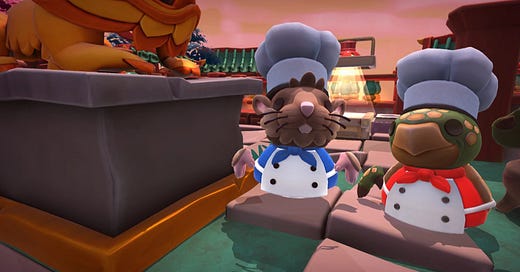Video Games Helped Teach My Daughter Teamwork
By gaming with me, she’s learning what it feels like to work with a supportive teammate who gives and takes feedback.
Whenever I’ve observed my pre-teen daughter working with her classmates, she stayed passive and only spoke when spoken to. When things went wrong, she usually avoided conflict when dealing with people outside her circle of friends and family.
As our kids get older, we only have so much influence on how they handle themselves in social situations. They’re on their own! Recently, though, I discovered the way I’ve been playing co-op video games has started influencing how she approaches these problems.
Previously, most of our early gaming sessions revolved around competition. Mario Kart 8, Super Smash Bros. Ultimate, and Nintendo Switch Sports were engaging and fun. They were a safe space to explore the emotional rollercoaster of winning and losing.
My daughter’s friends eventually introduced her to Roblox and, being the try-anything-once gaming dad I am, I made my own account, too.
Now, Roblox is a lot of things, but what it did do is let me see how my daughter responds to different kinds of games. And while her competitive streak was still there and in full force (damn you, Obbies), I was pleasantly surprised to discover how much she liked co-op games, like Overcooked 2 and Heave Ho!
Playing co-op games required a little adjustment on my part. As the adult and (supposedly) wiser of the team, I found myself ordering her around. A lot. And while my daughter followed along for the most part, there were times when I could feel a bit of hard-headed resistance and possibly even resentment to some of my calls. She was drawing back, the same way I observed her doing in school group activities.
In subsequent gaming sessions, I made a concerted effort to back off. Instead of telling her what to do, I let her act on her own initiative.
If I did want to do something, I phrased it as a suggestion which she was free to reject—and she often did. She was exercising her own judgment in a group environment and seeing how her decisions affected the team (for good or ill). I let her pick her in-game roles and made her an equal partner when planning strategy. She did so with a lot more enthusiasm than our previous gaming sessions, which was a great sign.
At one point, we were playing the cooking game Overcooked 2.
Orders were coming in hard and fast. My daughter was much faster than I was at prepping food and moving from station to station, so we agreed my role was to be support: feeding her ingredients, serving the completed dishes, and responding to all the random events the game would throw at us. We communicated constantly, often in one- or two-word sentences reminiscent of Hell’s Kitchen (a show my daughter loves). It was stressful, yet zen. We had a flow going—teamwork that just clicked.
Alongside these experiences, I noticed that she started participating more in group discussions and standing by her opinions. It was progress.
But our gaming sessions weren’t always so smooth. Sometimes a tough level would just get the better of us and we’d fail multiple times. Other times, one of us would stray from the plan and make a run-ending mistake. Tempers would get high and we’d snap at each other. In one notable instance, my wife had to step in and make us change the game we were playing just to cool things down.
Importantly, this was more aggressive behavior my daughter had never shown in school.
“What I do see is someone who is comfortable where she is, but also getting used to asserting herself when she needs to. By gaming with me, she’s learning what it feels like to work with a supportive teammate who gives and takes feedback.”
Just a couple weeks back, a classmate of hers wasn’t pulling their weight in a partner project. It was clearly frustrating her, but she wasn’t the type to openly berate the person. Instead, she decided to bombard the person with follow-ups. She didn’t call them out for being lazy, just constantly asked them in Discord and email when they’d be able to finish their part of the presentation. I’m happy to say that this classmate did eventually turn in their share of the slides, even if it was at the last minute.
I asked my daughter about this change, and she did confirm that our gaming sessions had made her more comfortable with expressing herself. She says she feels more confident in groups and is less intimidated by others with strong personalities.
I’m not under any illusions that co-op gaming is going to magically turn my shy daughter into a hard-charging ladyboss. She still avoids conflict as much as she can. She still refuses to play competitive games where there’s a high chance of encountering toxic players (even if I’m there with her in voice chat), and she’d still rather be a follower than a leader in school projects.
But what I do see is someone who is comfortable where she is, but also getting used to asserting herself when she needs to. By gaming with me, she’s learning what it feels like to work with a supportive teammate who gives and takes feedback, and I’m hoping she keeps that model in mind as she works with others in real life.
I just hope she doesn’t start talking trash.







Love this! So much good stuff about how games can foster self determination and competence!
This was a really lovely article!